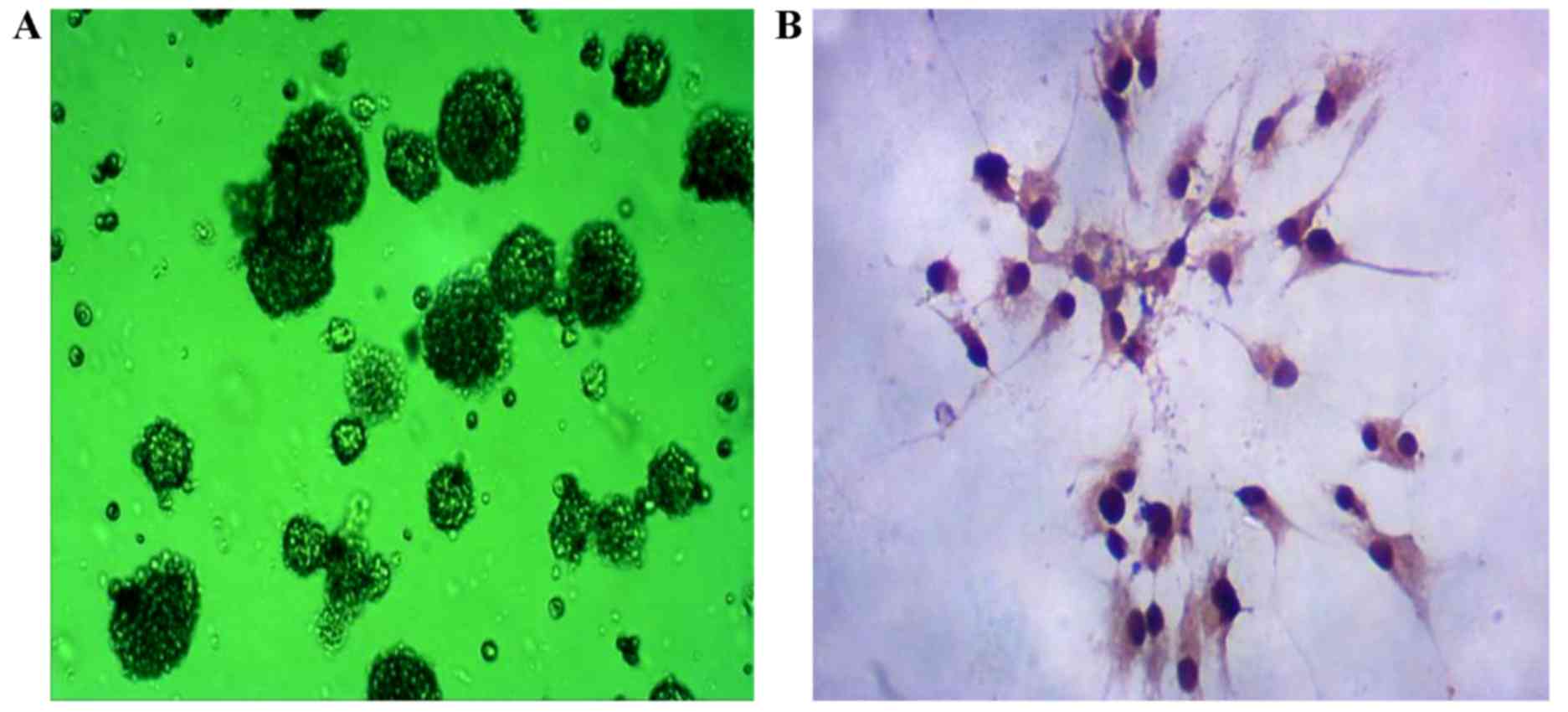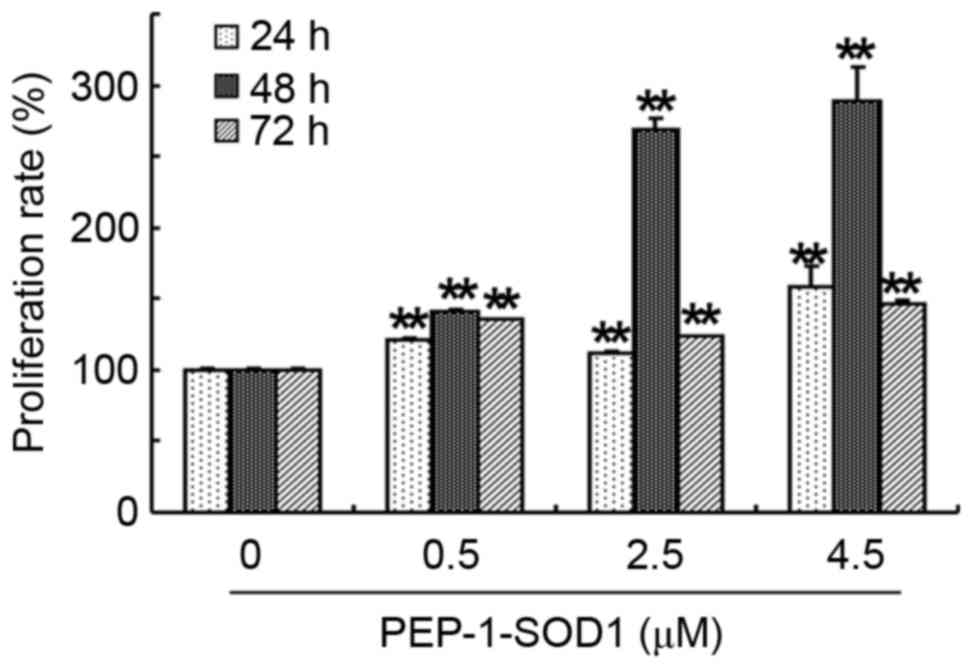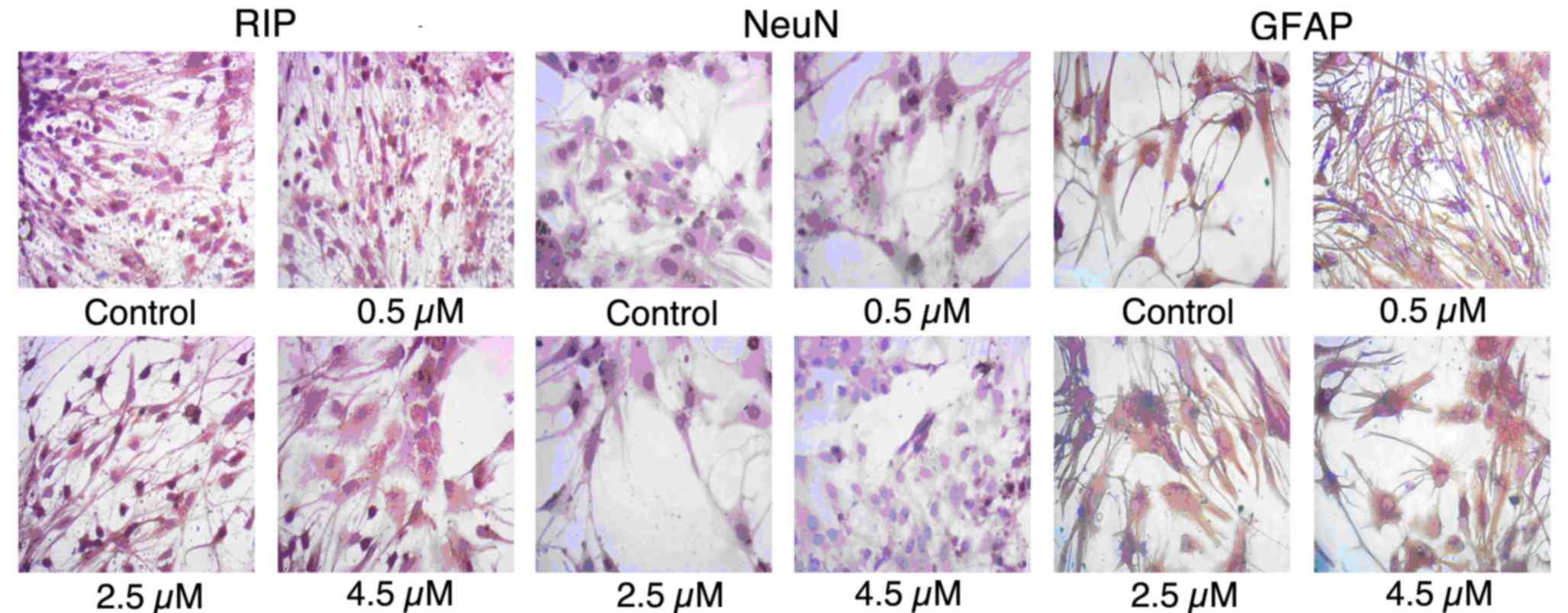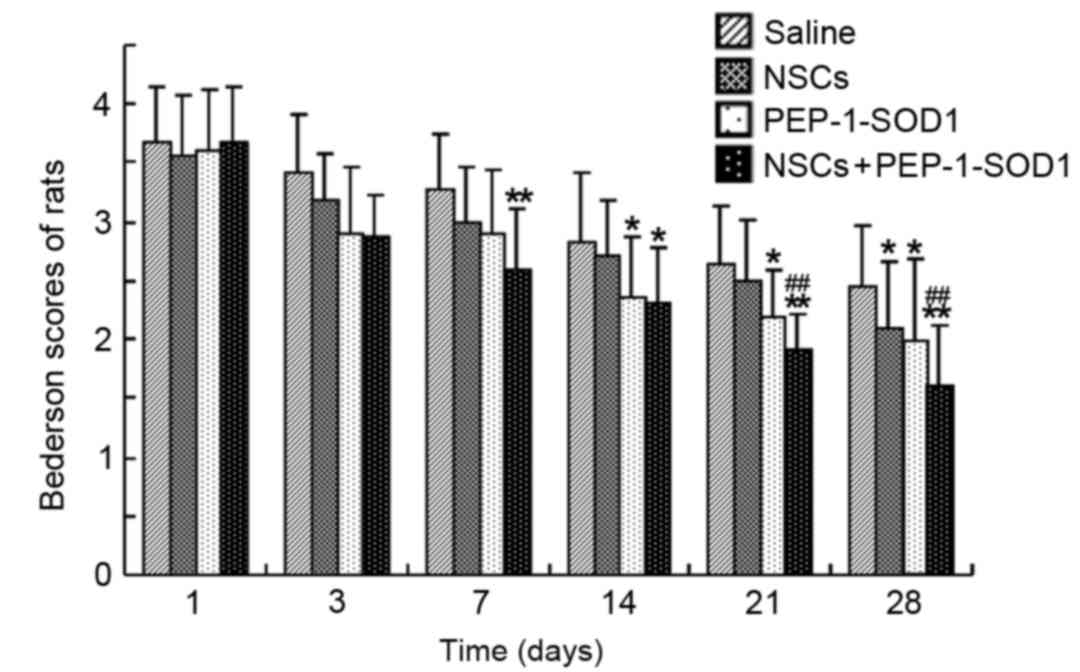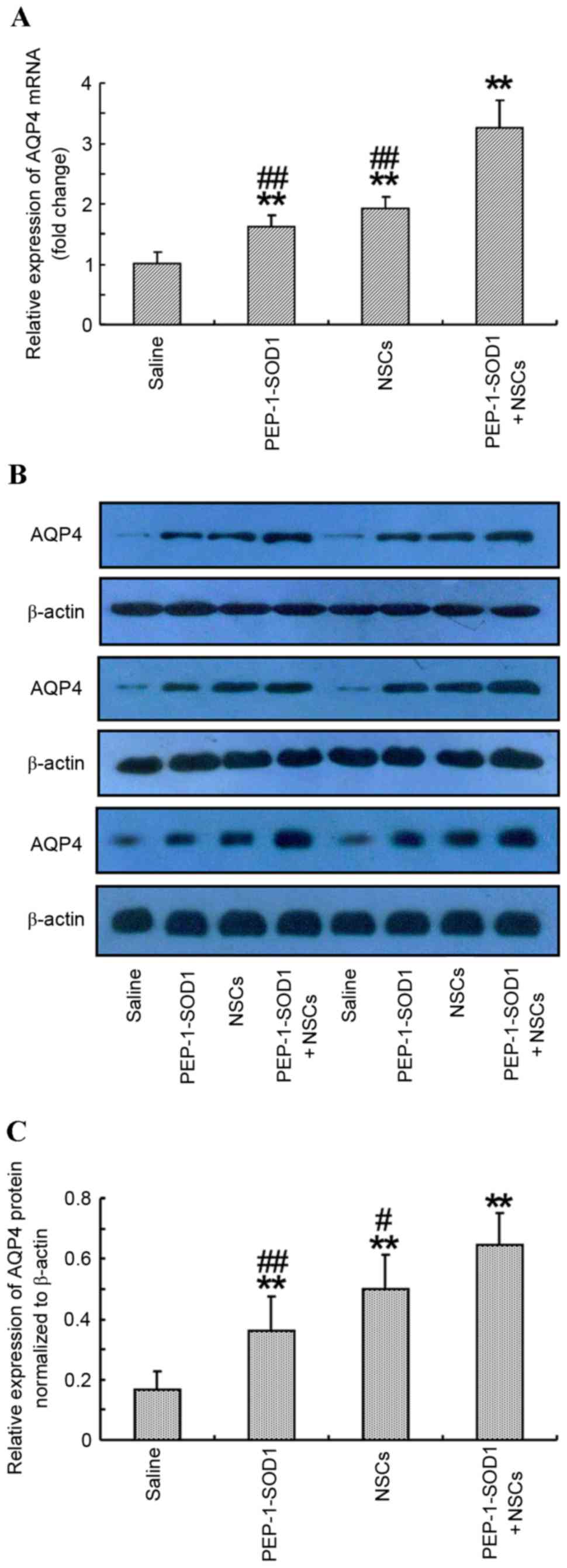|
1
|
Moppett IK: Traumatic brain injury:
Assessment, resuscitation and early management. Br J Anaesth.
99:18–31. 2007. View Article : Google Scholar : PubMed/NCBI
|
|
2
|
Rossi F and Cattaneo E: Opinion: Neural
stem cell therapy for neurological diseases: Dreams and reality.
Nat Rev Neurosci. 3:401–409. 2002. View
Article : Google Scholar : PubMed/NCBI
|
|
3
|
Xiong Z, Zhao S, Mao X, Lu X, He G, Yang
G, Chen M, Ishaq M and Ostrikov K: Selective neuronal
differentiation of neural stem cells induced by nanosecond
microplasma agitation. Stem Cell Res. 12:387–399. 2014. View Article : Google Scholar : PubMed/NCBI
|
|
4
|
Ma H, Yu B, Kong L, Zhang Y and Shi Y:
Transplantation of neural stem cells enhances expression of
synaptic protein and promotes functional recovery in a rat model of
traumatic brain injury. Mol Med Rep. 4:849–856. 2011.PubMed/NCBI
|
|
5
|
Addington CP, Roussas A, Dutta D and
Stabenfeldt SE: Endogenous repair signaling after brain injury and
complementary bioengineering approaches to enhance neural
regeneration. Biomark Insights. 10 Suppl 1:S43–S60. 2015.
|
|
6
|
Lozano D, Gonzales-Portillo GS, Acosta S,
de la Pena I, Tajiri N, Kaneko Y and Borlongan CV:
Neuroinflammatory responses to traumatic brain injury: Etiology,
clinical consequences and therapeutic opportunities. Neuropsychiatr
Dis Treat. 11:97–106. 2015.PubMed/NCBI
|
|
7
|
Kabadi SV and Faden AI: Neuroprotective
strategies for traumatic brain injury: Improving clinical
translation. Int J Mol Sci. 15:1216–1236. 2014. View Article : Google Scholar : PubMed/NCBI
|
|
8
|
Dasuri K, Zhang L and Keller JN: Oxidative
stress, neurodegeneration, and the balance of protein degradation
and protein synthesis. Free Radic Biol Med. 62:170–185. 2013.
View Article : Google Scholar : PubMed/NCBI
|
|
9
|
Mutinati M, Pantaleo M, Roncetti M,
Piccinno M, Rizzo A and Sciorsci RL: Oxidative stress in
neonatology: A review. Reprod Domest Anim. 49:7–16. 2014.
View Article : Google Scholar : PubMed/NCBI
|
|
10
|
Wang JW, Wang HD, Cong ZX, Zhou XM, Xu JG,
Jia Y and Ding Y: Puerarin ameliorates oxidative stress in a rodent
model of traumatic brain injury. J Surg Res. 186:328–337. 2014.
View Article : Google Scholar : PubMed/NCBI
|
|
11
|
Peluffo H, Acarin L, Faiz M, Castellano B
and Gonzalez B: Cu/Zn superoxide dismutase expression in the
postnatal rat brain following an excitotoxic injury. J
Neuroinflammation. 2:122005. View Article : Google Scholar : PubMed/NCBI
|
|
12
|
Sakata H, Niizuma K, Wakai T, Narasimhan
P, Maier CM and Chan PH: Neural stem cells genetically modified to
overexpress cu/zn-superoxide dismutase enhance amelioration of
ischemic stroke in mice. Stroke. 43:2423–2429. 2012. View Article : Google Scholar : PubMed/NCBI
|
|
13
|
Wakai T, Sakata H, Narasimhan P, Yoshioka
H, Kinouchi H and Chan PH: Transplantation of neural stem cells
that overexpress SOD1 enhances amelioration of intracerebral
hemorrhage in mice. J Cereb Blood Flow Metab. 34:441–449. 2014.
View Article : Google Scholar : PubMed/NCBI
|
|
14
|
Cho JH, Hwang IK, Yoo KY, Kim SY, Kim DW,
Kwon YG, Choi SY and Won MH: Effective delivery of Pep-1-cargo
protein into ischemic neurons and long-term neuroprotection of
Pep-1-SOD1 against ischemic injury in the gerbil hippocampus.
Neurochem Int. 52:659–668. 2008. View Article : Google Scholar : PubMed/NCBI
|
|
15
|
Yune TY, Lee JY, Jiang MH, Kim DW, Choi SY
and Oh TH: Systemic administration of PEP-1-SOD1 fusion protein
improves functional recovery by inhibition of neuronal cell death
after spinal cord injury. Free Radic Biol Med. 45:1190–1200. 2008.
View Article : Google Scholar : PubMed/NCBI
|
|
16
|
Piao J, Major T, Auyeung G, Policarpio E,
Menon J, Droms L, Gutin P, Uryu K, Tchieu J, Soulet D and Tabar V:
Human embryonic stem cell-derived oligodendrocyte progenitors
remyelinate the brain and rescue behavioral deficits following
radiation. Cell Stem Cell. 16:198–210. 2015. View Article : Google Scholar : PubMed/NCBI
|
|
17
|
Kabeer FA, Sreedevi GB, Nair MS,
Rajalekshmi DS, Gopalakrishnan LP, Kunjuraman S and Prathapan R:
Antineoplastic effects of deoxyelephantopin, a sesquiterpene
lactone from Elephantopus scaber, on lung adenocarcinoma (A549)
cells. J Integr Med. 11:269–277. 2013. View Article : Google Scholar : PubMed/NCBI
|
|
18
|
Li Y, Wang X, Cheng S, Du J, Deng Z, Zhang
Y, Liu Q, Gao J, Cheng B and Ling C: Diosgenin induces G2/M cell
cycle arrest and apoptosis in human hepatocellular carcinoma cells.
Oncol Rep. 33:693–698. 2015. View Article : Google Scholar : PubMed/NCBI
|
|
19
|
Yao ZG, Sun XL, Li P, Liu HL, Wu HL, Xi ZQ
and Zheng ZH: Neural stem cells transplantation alleviate the
hyperalgesia of spinal cord injured (SCI) associated with
down-regulation of BDNF. Int J Clin Exp Med. 8:404–412.
2015.PubMed/NCBI
|
|
20
|
Zhao J, Chen N, Shen N, Zhao H, Wang D,
Shi J, Wang Y, Cui X, Yan Z and Xue H: Transplantation of human
umbilical cord blood mesenchymal stem cells to treat a rat model of
traumatic brain injury. Neural Regen Res. 7:741–748.
2012.PubMed/NCBI
|
|
21
|
Crumrine RC, Marder VJ, Taylor GM, Lamanna
JC, Tsipis CP, Scuderi P, Petteway SR Jr and Arora V:
Intra-arterial administration of recombinant tissue-type
plasminogen activator (rt-PA) causes more intracranial bleeding
than does intravenous rt-PA in a transient rat middle cerebral
artery occlusion model. Exp Transl Stroke Med. 3:102011. View Article : Google Scholar : PubMed/NCBI
|
|
22
|
Bederson JB, Pitts LH, Tsuji M, Nishimura
MC, Davis RL and Bartkowski H: Rat middle cerebral artery
occlusion: Evaluation of the model and development of a neurologic
examination. Stroke. 17:472–476. 1986. View Article : Google Scholar : PubMed/NCBI
|
|
23
|
Arocho A, Chen B, Ladanyi M and Pan Q:
Validation of the 2-DeltaDeltaCt calculation as an alternate method
of data analysis for quantitative PCR of BCR-ABL P210 transcripts.
Diagn Mol Pathol. 15:56–61. 2006. View Article : Google Scholar : PubMed/NCBI
|
|
24
|
Ryu HH, Lim JH, Byeon YE, Park JR, Seo MS,
Lee YW, Kim WH, Kang KS and Kweon OK: Functional recovery and
neural differentiation after transplantation of allogenic
adipose-derived stem cells in a canine model of acute spinal cord
injury. J Vet Sci. 10:273–284. 2009. View Article : Google Scholar : PubMed/NCBI
|
|
25
|
Takemura S, Kayama T, Kuge A, Ali H,
Kokubo Y, Sato S, Kamii H, Goto K and Yoshimoto T: Correlation
between copper/zinc superoxide dismutase and the proliferation of
neural stem cells in aging and following focal cerebral ischemia. J
Neurosurg. 104:129–136. 2006. View Article : Google Scholar : PubMed/NCBI
|
|
26
|
Sun F, Jin K and Uteshev VV: A type-II
positive allosteric modulator of α7 nAChRs reduces brain injury and
improves neurological function after focal cerebral ischemia in
rats. PLoS One. 8:e735812013. View Article : Google Scholar : PubMed/NCBI
|
|
27
|
Crumrine RC, Marder VJ, Taylor GM, Lamanna
JC, Tsipis CP, Novokhatny V, Scuderi P, Petteway SR Jr and Arora V:
Safety evaluation of a recombinant plasmin derivative lacking
kringles 2–5 and rt-PA in a rat model of transient ischemic stroke.
Exp Transl Stroke Med. 4:102012. View Article : Google Scholar : PubMed/NCBI
|
|
28
|
Marmarou A: Pathophysiology of traumatic
brain edema: Current concepts. Acta Neurochir Suppl. 86:7–10.
2003.PubMed/NCBI
|
|
29
|
Badaut J, Ashwal S and Obenaus A:
Aquaporins in cerebrovascular disease: A target for treatment of
brain edema? Cerebrovasc Dis. 31:521–531. 2011. View Article : Google Scholar : PubMed/NCBI
|
|
30
|
Panikashvili D, Shein NA, Mechoulam R,
Trembovler V, Kohen R, Alexandrovich A and Shohami E: The
endocannabinoid 2-AG protects the blood-brain barrier after closed
head injury and inhibits mRNA expression of proinflammatory
cytokines. Neurobiol Dis. 22:257–264. 2006. View Article : Google Scholar : PubMed/NCBI
|
|
31
|
Lopez-Rodriguez AB, Acaz-Fonseca E,
Viveros MP and Garcia-Segura LM: Changes in cannabinoid receptors,
aquaporin 4 and vimentin expression after traumatic brain injury in
adolescent male mice. Association with edema and neurological
deficit. PLoS One. 10:e01287822015. View Article : Google Scholar : PubMed/NCBI
|
|
32
|
Ding Z, Zhang J, Xu J, Sheng G and Huang
G: Propofol administration modulates AQP-4 expression and brain
edema after traumatic brain injury. Cell Biochem Biophys.
67:615–622. 2013. View Article : Google Scholar : PubMed/NCBI
|
|
33
|
Cui T and Zhu G: Ulinastatin attenuates
brain edema after traumatic brain injury in rats. Cell Biochem
Biophys. 71:595–600. 2015. View Article : Google Scholar : PubMed/NCBI
|
|
34
|
Fukuda AM, Adami A, Pop V, Bellone JA,
Coats JS, Hartman RE, Ashwal S, Obenaus A and Badaut J:
Posttraumatic reduction of edema with aquaporin-4 RNA interference
improves acute and chronic functional recovery. J Cereb Blood Flow
Metab. 33:1621–1632. 2013. View Article : Google Scholar : PubMed/NCBI
|
|
35
|
Fukuda AM and Badaut J: Aquaporin 4: A
player in cerebral edema and neuroinflammation. J
Neuroinflammation. 9:2792012. View Article : Google Scholar : PubMed/NCBI
|
|
36
|
Tourdias T, Mori N, Dragonu I, Cassagno N,
Boiziau C, Aussudre J, Brochet B, Moonen C, Petry KG and Dousset V:
Differential aquaporin 4 expression during edema build-up and
resolution phases of brain inflammation. J Neuroinflammation.
8:1432011. View Article : Google Scholar : PubMed/NCBI
|















